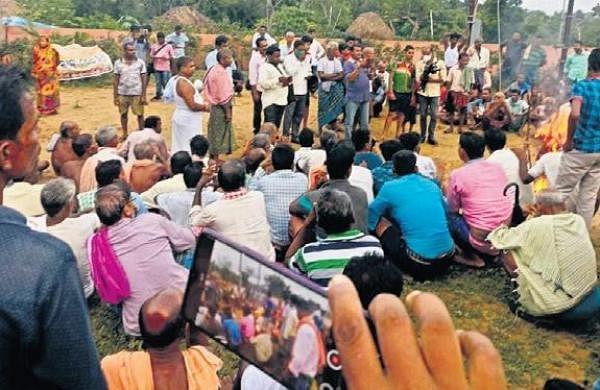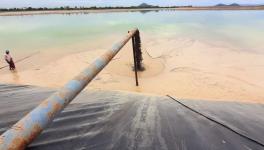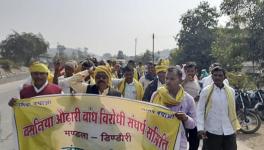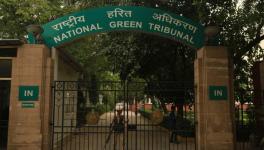Dhinkia: A Story of Perseverance Against Administrative Oppression

Image: The New Indian Express
Abide by forest land rights laws and implement the National Green Tribunal’s (NGT) orders to remove any construction already made on forest land, demanded the Anti- Jindal & Anti-POSCO Movement on December 27, 2021.
Dhinkia villagers in Jagatsinghpur district have been protesting for years against the Odisha administration’s attempts to hand over more than 2,900 acres of fertile agricultural land to the Indian steel major Jindal Steel. Around 2016, the land was given up by South Korean company POSCO and handed to the JSW Utkal Steel Ltd. The company planned to build a 13.2 MTPA crude steel, 900MW captive power and 10 MTPA cement along with 52 MTPA captive jetty. However, villagers questioned the state government’s authority in doing so when local gram sabhas hadn’t even given their consent for a development project in their area.
No Environmental Clearance
Since 2018, the JSW Utkal Steel has repeatedly attempted to get an environmental clearance from the Union Ministry of Environment, Forest and Climate Change (MoEFCC). However, as per the Environmental Impact Assessment (EIA) Notification 2006, the document requires the permission of the affected people via gram sabha consent.
For this, authorities called for a public hearing that was allegedly hijacked by the District Collector Sangram Mohapatra, who was the Land Acquisition Officer of IDCO during the earlier POSCO project in 2005. Under his watch children and elderly people were allegedly physically assaulted during land acquisition. More than 15-20 platoons of police arrived at the spot and allowed only those individuals who were in support of the project to leave.
In retaliation, villagers called for a “palli sabha” (Village meeting) and passed a resolution rejecting the proposed project of JSW Utkal Steel Ltd by thousands of people. Further shortcomings and false information in its Environmental Impact Assessment (EIA) and Environmental Management Plan (EMP) report have kept the company from availing the clearance.
However, since the EC request is yet to be dismissed, nervous villagers urgently demand the completion of their individual and community forest rights claims on land. Doing so will ensure that the land belongs to the villagers, and is not transferred to a land bank.
Villagers demanded that the process of fresh land acquisition and fencing be suspended as there is no environment clearance for the proposed project of JSW. Yet, the police continue to deploy personnel around the village.
Police conflicts
In recent weeks, villagers have decried and demanded the withdrawal of the heavy police deployment around their houses. These security checks into and away from the village have persisted since the recent conflict in December 2021.
On December 20, villagers, decrying the administrative repression at Mahala village border, suffered beating by police. Personnel arrived in seven Bolero vans and arrested rights leader Debendra Swain. They also took away his uncle, Ayodhya Swain, who is a paralysis patient, and his daughter Mili Swain and charged all three persons under various sections of the IPC.
“Our villagers are facing hardships due to the police action. The situation has come to such a pass that the villagers are being asked to show their Aadhaar cards to go out and enter their village. The police have been raiding the village, breaking into houses, attacking the villagers causing injuries, implicating people in false cases and restricting them to their houses,” said movement spokesperson Prashant Paikray.
He condemned the local administration’s attempts to forcefully demarcate the Mahala revenue village. Residents opposed this, calling it an “illegal move”. On December 6, they even erected bamboo barricades and guarded the same to keep any police, government officials from entering.
Fabricated FIRs
Prior to the Mahala incident, the district administration called for a public hearing on November 21, to discuss the thermal power plant project. Activists Goutam Das, Bikram Das and other human rights defenders attended the hearing and objected to the presence of JSW company officials on the dais while speaking at the programme.
On the same day, the Abhayachandpur Police Station registered an FIR against Goutam Das, Bikram Das, Manas Bardhan, Prabhat Biswal, Kuni Mallick, Shanti Sethy, Shanti Das, Latika Parida and nine other unnamed persons for criminal intimidation and other sections of the IPC.
Condemning the incident, the Human Rights Defenders – Alert forum said, “We believe that the police acted with malafide intentions to target Das and other HRDs in reprisal for their opposition to the JSW Utkal project and as reprisal for their activities as environment activists. Though no one has been arrested in the case yet, Das and others in the area fear they might be illegally detained and arrested arbitrarily and illegally.”
As such, it directed the Director General of Police to look into the attempted abduction and fabricated case against the HRDs and submit a report within two weeks. However, all of this could have been avoided if the government acknowledged their forest rights.
Violation of LARR 2013 and Forest Rights Act 2006
According to the Right to Fair Compensation and Transparency in Land Acquisition, Rehabilitation and Resettlement Act (LARR) of 2013 “land acquired and possession taken over but not utilized within a period of five years from the date of possession shall in all cases revert back to the original land owner.” Yet, ignoring this provision, the Odisha government on February 7, 2015 declared, “land acquired… but not utilized within a period of five years from the date of possession shall in all cases revert back to the state and be deposited in the Land Bank automatically.”
This notification goes against the Forest Rights Act 2006 as well that recognizes legal rights of local communities over forest land and community forest resources. Three different official committees i.e., the Saxena Committee, the POSCO Enquiry Committee and the FAC found that the law was violated in the proposed POSCO area.
The Movement demanded that the administration acknowledge that there is no provision which provides for land acquisition for any land bank. As such, the land must return to the original inhabitants.
“The government must respect the unanimous resolution passed by over 2,000 people at a Gram Sabha held in October 2012 that the land used for betel cultivation was under the rights provided to the Gram Sabha under the Forest Rights Act (FRA), 2006,” said Paikray.
He warned that continued state conflicts will also violate the IPC and the SC/ST Prevention of Atrocities Act 1989 and the amendments done in 2016.
Villagers demands
After years of protest, Dhinkia folk have nowadays voiced an additional demand that the government replant the trees in the coastal area that lost more than two lakh trees when the land was handed over to POSCO.
Similarly, they asked for a committee consisting of sensitive jurists, human rights advocates, activists, ecologists and ecological economists to keep a watch on what the government is doing in our area.
Get the latest reports & analysis with people's perspective on Protests, movements & deep analytical videos, discussions of the current affairs in your Telegram app. Subscribe to NewsClick's Telegram channel & get Real-Time updates on stories, as they get published on our website.
























